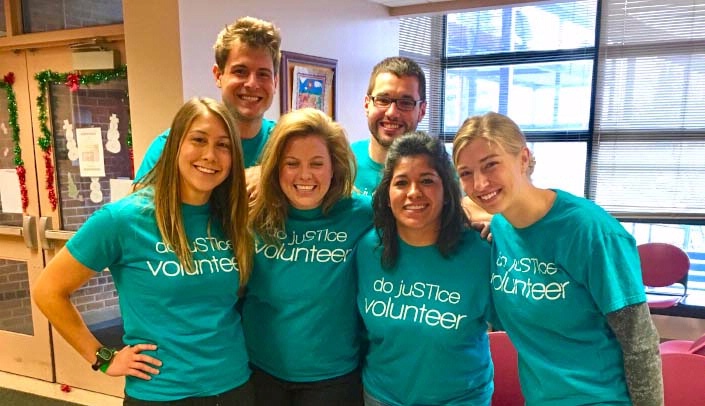A UNMC student organization is having a big impact on Douglas County.
Do juSTIce, which began in 2008 in the College of Public Health and is now part of the UNMC Office of Community Engagement, is reaching out to impact the high sexually transmitted infection (STI) rates in the county.
Collaboration
Dr. Simonsen noted that the Do juSTIce program would not succeed without the ongoing efforts and collaboration of many UNMC faculty and partners, which include:
- Douglas County Health Department;
- Nebraska Department of Health and Human Services;
- Douglas County Department of Corrections and Youth Corrections;
- Community Alliance;
- Omaha Home for Boys; and
- Creighton University.
Bianca Christensen, past president of the organization, said Do juSTIce provides testing and education at four sites in Douglas County: the Douglas County Jail downtown, the Douglas County Youth Center, the Omaha Home for Boys (which has boys and girls aging out of the foster-care system) and two Community Alliance locations.
“We try to reach as many people as we can through those sites,” she said.
The organization has provided testing to 1,900 people at the Douglas County Jail between October 2013 and June 2016, but estimates volunteers have tested approximately 4,000 people since 2009.
“UNMC students are truly leading this community-based service learning program and providing the opportunity to test and treat STIs in a vulnerable patient population,” said Kari Simonsen, M.D., associate professor, pediatric infectious diseases and a faculty advisor for the group. “In addition, they learn organizational leadership skills, have a chance to educate the community about STIs, and are gaining important clinical abilities in patient interviewing and giving sensitive test results to patients.”
Scholastic impact
There has been significant opportunity for student and faculty scholarship from the Do JuSTIce program, including four manuscripts and one book chapter, three graduate theses and additional poster presentations of abstracts at local and national meetings.
Key findings from the published work to date include:
- higher rates of STIs in jail inmates than the general population of DCHD;
- high rates of risk factors for STIs among patients; and
- significant need for education — which the students are bringing to them through presentations and one-on-one interviews and Q&As.
“In terms of education, which we do at the jail, Douglas County Youth Center, and Community Alliance combined, a conservative estimate would be that we have educated almost 12,000 people,” Christensen said.
The group primarily contains UNMC medical, nursing and public health students, as well as Creighton medical students, but any student who has an interest in patient care and public health is welcome to join. There are more than 100 students in the group, with approximately 25-30 regular volunteers.
“We have very high rates of both chlamydia and gonorrhea and increasing rates of syphilis here in Douglas County — the average rates are higher than the national average and even higher than the Nebraska average,” Christensen said.
“Our goal is to educate people in the community who are either at high risk or just won’t have the access to other education,” she said. “And to get them treated.”
Many myths abound about STIs, making education a priority, she said.
“I think that it does speak to how much need there is in the community for STI education,” Christensen said. “It’s one of those taboo topics, so we try to open up that conversation about sexual health.”

Congrats to the Do JuSTIce volunteers! This looks like a very strong outreach, care of the individual, and public health effort. It makes a difference.